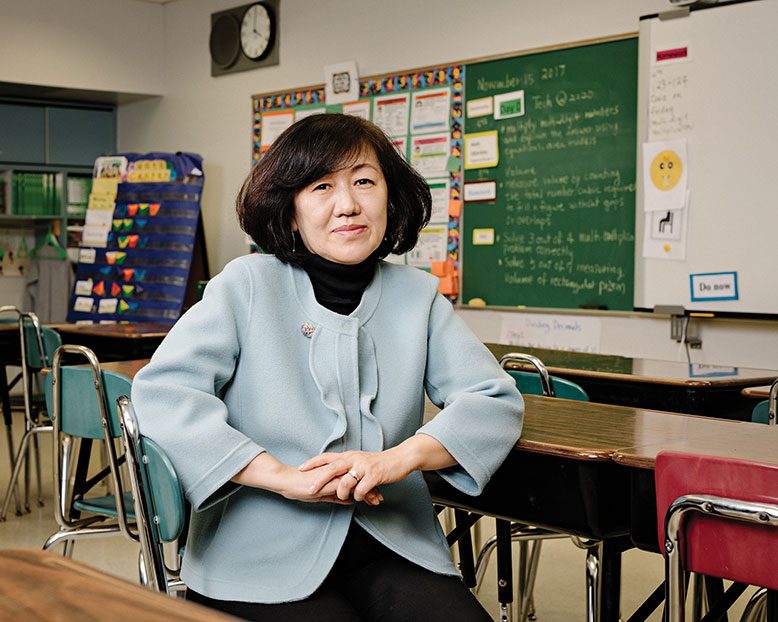
For a long time after she emigrated from South Korea as a teen, Sunjoo Hwang Kim felt like an outsider in America. It took a national tragedy—the terror attacks of September 11, 2001—to make her realize just how deep her roots had grown in her adopted homeland.
Kim, now 58 and a fourth-grade teacher in Paterson, was at a training session when the jets hit the World Trade Center. “We watched TV and started crying,” says Kim. “I just realized from that day, I’m not just Korean, I’m American. No matter what, I’m part of this society. I’m crying when I look at the American flag.”
Kim’s father came to the United States in 1970, about five years after U.S. immigration reforms eased the way for South Koreans and many other nationalities. His wife and three children followed a few years later; at the time, Kim, the middle child, was 16. Her father and uncles opened a small grocery store and settled the family in Brooklyn.
Unable to speak English, Kim struggled at school. Shakespeare and Dostoyevsky were beyond her. But she appreciated the encouragement of her teachers.
Her first Halloween was a revelation. “I thought America was great,” she recalls. “You can just knock on the door and they give you free candy.”
Kim studied design at Pratt Institute, married a fellow Korean immigrant, eventually moved to Fort Lee, and later, Tenafly, drawn by its highly rated schools.
The couple’s arrival here is emblematic of the Korean community’s growth in suburban New Jersey. The 2010 Census counted 93,679 people of Korean background in New Jersey, up 43 percent from 2000. More than 60 percent of that group lived in Bergen County, mostly eastern Bergen. The Korean community makes up more than half of the population of Palisades Park; in Leonia and Fort Lee, it’s about 25 percent.
The Korean influence is clear along Broad Avenue in Palisades Park, where Korean-language signs dominate the popular shopping street. Bergen County has added Korean translations to election ballots; libraries offer Korean-language story time for children, and Holy Name Medical Center in Teaneck runs a health care program aimed at the Korean community.
Like many immigrants, Kim lives in two worlds. Her husband, Dong Suk Kim, is executive committee chair and cofounder of the group Korean American Civic Empowerment. And along with her work in the public school, Kim is principal of a Korean-language school in Tenafly that serves more than 400 children.
“If they know their Korean culture, even though they’re American, I think they can know other cultures,” she says. “It makes them better Americans.”
Kim became a teacher after the birth of her son, now 27. She has taught in Paterson since 1998. Many of her students are from immigrant families.
In Paterson, she says, “there are many kids who need help as much as Korean kids.” While other teachers ask why parents aren’t more involved in their children’s schoolwork, she relates to the challenges faced by immigrant families.
“That parent doesn’t speak English; how can they help their child?” she asks. “In immigrant families, parents have to work long hours; some work two shifts.”
Kim’s favorite American holiday is Thanksgiving, when her extended family gathers for turkey and karaoke, including Kim’s brother, who owns a headhunting company, and sister, who owns a pharmacy, both in Fort Lee.
On the other hand, the family marks New Year’s Day in Korean style. Children bow to their parents to show their respect, then discuss goals for the new year. Their parents give them money, and the family digs into specialties like japchae (a vegetable/noodle stir-fry) and galbi (short ribs).
“I want to be part of America,” says Kim. “But I can still keep my traditions.”
